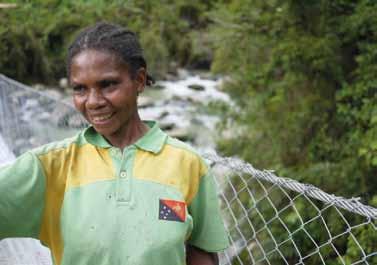
Description of the project: CARE’s Integrated Community Development Project (ICDP) has been developed since 2009 in Papua New Guinea, where people have limited or no access to income, basic services, markets, transport and experience seasonal food insecurity. The programme‘s goal is to bring about significant and sustainable improvement in the lives of women, girls and their families living in remote and disadvantaged areas. An independent external evaluation conducted in June 2014 confirmed the ICDP Pilot has brought about real progress: “The main conclusion of this evaluation is that ICDP is making a significant and tangible contribution to improving the wellbeing of disadvantaged communities living in remote areas of PNG.”
Climate Impact: The long term impact and sustainability of the interventions piloted through ICDP are yet to be proven. However, the initial results are encouraging. Improved ward level planning and targeted community support has resulted in changes to farming practices through the school’s climate resilient agriculture activity. As well, girls were able to use and transfer the knowledge gained to their mothers at home. The leveraging of national and local government budgets has funded necessary local infrastructure projects such as footbridges has enabled women from remote rural areas access to the local markets to sell their produce. As a result, the project provides an increase in household income, but most importantly more girls are able to cross fast flooding rivers to attend school. The footbridge has also significantly reduced the time it takes to reach basic services.
Gender Impact: CARE’s approach centres around building a supportive environment for rural service delivery by facilitating Ward Planning capacity and awareness, creating links between government, communities and local organizations, and modelling ways to support and deliver services and community development activities as identified in ward plans. A particular focus is women’s empowerment which is systematically advanced through all areas of its work with the aim to strengthen and better informed communities, government, and civil society organizations. Thereby working more effectively in partnership to identify, prioritise, address and advocate for development needs, improved access to basic services and improved, more secure and self-reliant livelihoods.